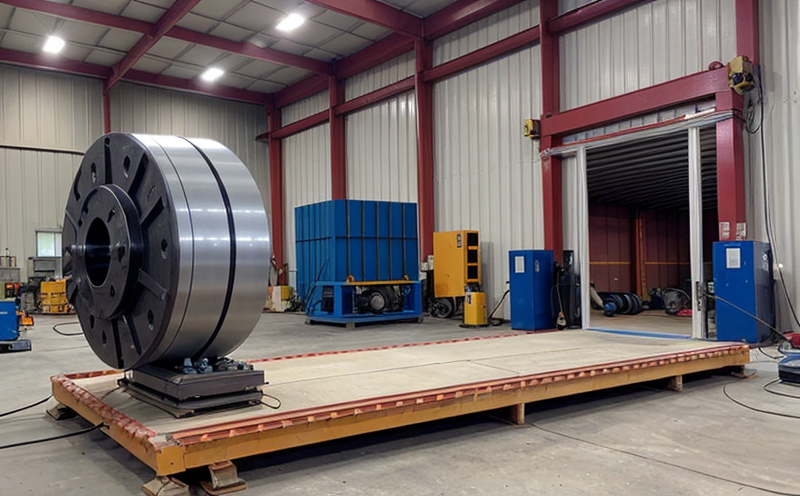ISO 294-6 Vehicle Dynamic Load Testing
The ISO 294 series of standards provides a comprehensive framework for testing the structural integrity and dynamic load capabilities of vehicles. Specifically, ISO 294-6 focuses on the vehicle dynamic load testing which is crucial in ensuring that vehicles can withstand the harsh conditions they are likely to encounter during operation.
This form of testing simulates real-world driving scenarios to assess how well a vehicle's structural components perform under dynamic loads. This includes sudden changes in speed, sharp turns, and other maneuvers that place stress on the vehicle’s frame, suspension system, and other critical parts. The tests are designed to identify potential weaknesses or design flaws before they become operational issues.
Dynamic load testing is essential for quality assurance in the automotive industry as it helps manufacturers ensure their vehicles meet stringent safety standards set by regulatory bodies worldwide. Compliance with these standards not only protects consumers but also ensures that vehicles perform reliably and safely under various operating conditions.
The ISO 294-6 standard specifies a series of test procedures for determining the dynamic load characteristics of a vehicle's structural components. This involves applying controlled forces to simulate real-world driving situations, measuring how these forces affect the vehicle’s performance, and evaluating any resulting deformations or stresses within the structure.
Testing typically begins with thorough preparation of both the test specimen (the vehicle) and the testing equipment itself. Calibration of all instruments involved in the measurement process is critical to ensure accurate data collection during testing. Specimen preparation includes ensuring that the vehicle’s tires are properly inflated, brakes are functioning correctly, and any modifications or attachments necessary for the test are securely fastened.
During actual testing, various parameters need to be monitored closely including displacement, acceleration, velocity, and force distribution across different parts of the vehicle. Specialized sensors placed throughout the structure capture this information which is then analyzed using sophisticated software tools provided by our laboratory. Our team ensures that all tests adhere strictly to ISO 294-6 guidelines ensuring reliable results.
Our state-of-the-art facilities allow us to conduct these tests under controlled conditions replicating real-world driving situations as closely as possible. This enables accurate assessment of how well a vehicle handles dynamic loads without exposing it directly to potentially damaging environments during the test process itself.
The results from this testing play an integral role in quality control processes by providing valuable insights into potential areas requiring improvement or refinement based on observed behaviors under specified conditions outlined within ISO 294-6. These findings contribute significantly towards maintaining high standards across all aspects of vehicle design and manufacturing practices globally.
- Ensures adherence to international safety standards
- Identifies structural integrity issues early in the development process
- Promotes continuous improvement through iterative testing cycles
- Facilitates compliance checks required by regulatory authorities
Benefits
The ISO 294-6 vehicle dynamic load testing offers numerous benefits to manufacturers and end-users alike. Firstly, it enhances overall product quality by identifying any defects or weaknesses in the structural components of vehicles early on in their development lifecycle. This allows for timely corrective actions ensuring that only reliable products reach marketplaces.
Secondly, compliance with these standards demonstrates a commitment to safety which builds consumer confidence and trust in automotive brands. Thirdly, it supports innovation by providing manufacturers with detailed feedback about their designs allowing them to make informed decisions regarding future improvements.
For end-users, compliant vehicles mean peace of mind knowing they have invested in safe and dependable transportation solutions. Additionally, this testing process helps reduce warranty claims and recalls thereby saving costs for both companies and consumers alike. Lastly but importantly, it contributes towards sustainable manufacturing practices by promoting efficient use of resources throughout the production cycle.
Quality and Reliability Assurance
Ensuring quality and reliability is paramount in any industry, especially when dealing with high-performance vehicles where even minor flaws could lead to significant safety risks. Our ISO 294-6 vehicle dynamic load testing service plays a crucial role in maintaining these standards by providing robust evidence that supports claims made about a product's capabilities.
Our team works closely with clients to understand their specific requirements before designing tailored test protocols. Using advanced instrumentation and software tools, we meticulously document every aspect of the testing process ensuring transparency and accuracy throughout. Post-test analysis involves thorough evaluation of all collected data against predefined acceptance criteria specified in ISO 294-6.
This rigorous approach guarantees that only vehicles meeting strict quality benchmarks are certified as compliant with relevant international standards. By incorporating feedback from these tests into ongoing development efforts, we help companies achieve long-term success by continuously improving their offerings based on real-world insights gained through this testing process.
Frequently Asked Questions
- Identifies areas for improving fuel efficiency by highlighting structural components that contribute to overall vehicle weight.
- Promotes the use of lighter materials which can reduce emissions without compromising safety.
- Encourages more efficient manufacturing processes leading to lower carbon footprints across supply chains involved in production.





